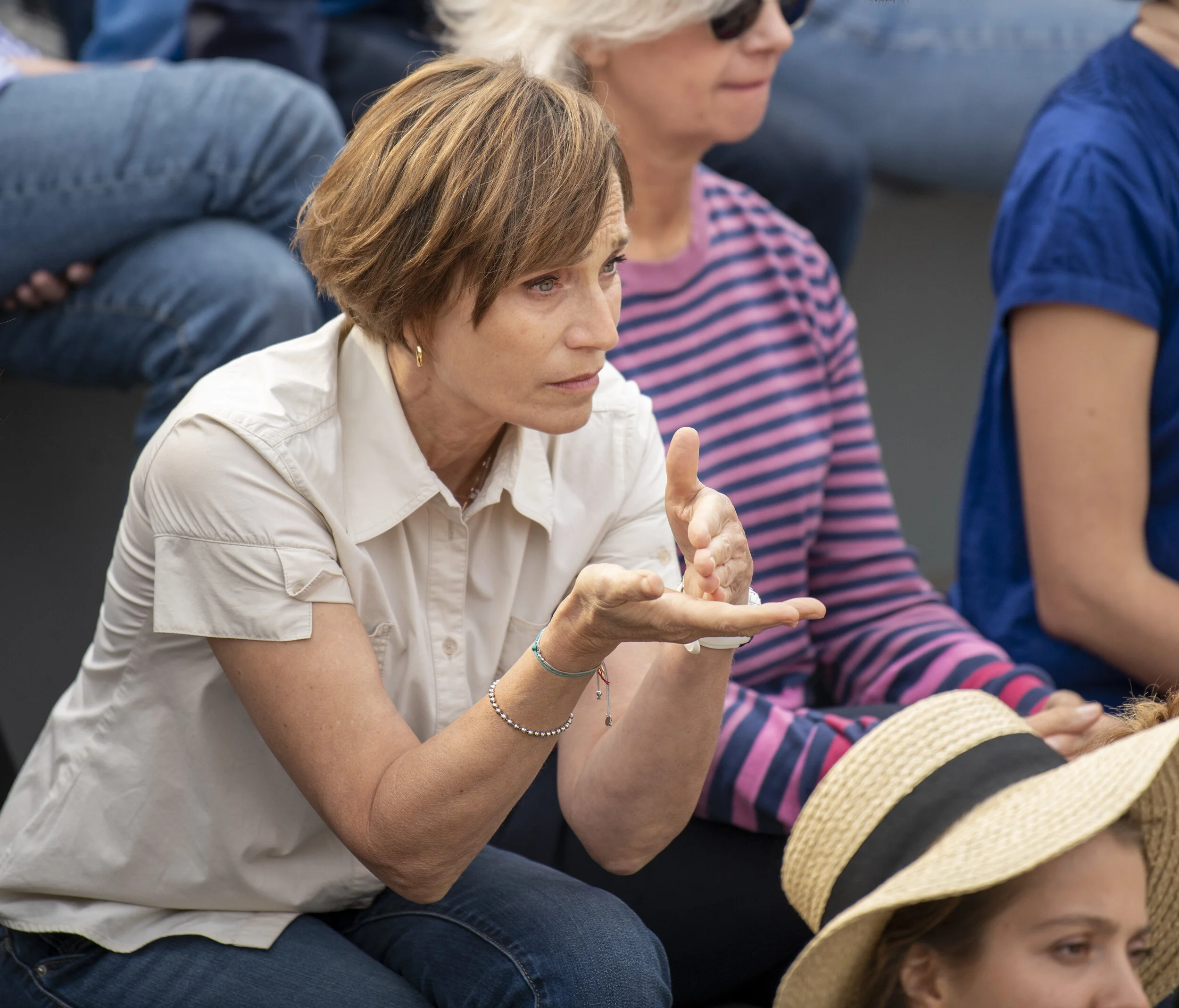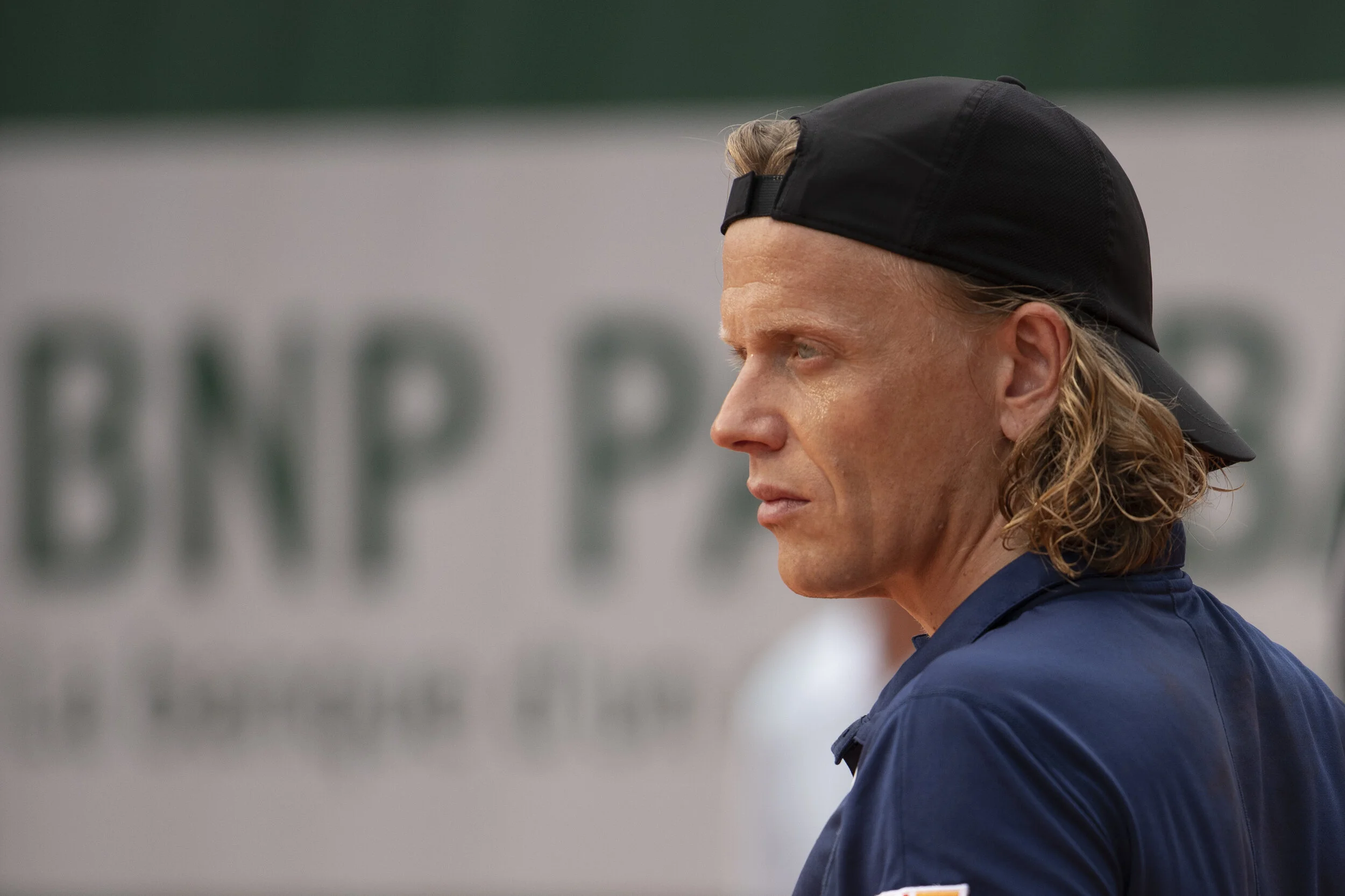Written and directed by: Quentin Reynaud
Starring: Alex Lutz, Kristin Scott Thomas, & Ana Girardot
Runtime: 1h 45min
“If you'd won quicker, you'd suffer less.”
Watching her son, thirty-something professional tennis player Thomas Edison (Alex Lutz) apply an ice pack to his knee during dinner, Judith (Kristin Scott Thomas) can't help but ask, “why lose the first set?”
Having helped propel Thomas to early greatness as a young prodigy, Judith struggles to remove her coaching hat to support her son the way that a typical mother would. Coming from a place of not only criticism but also love – because to care for Thomas and the knee he'd had operated on multiple times in the past is to question why he still feels the need to try to compete against the top players of the world at his age – to say that their relationship is complicated would be an understatement. But understating it is precisely what makes their dynamic and everything else in French writer-director Quentin Reynaud's “Final Set” so real and compelling.
Minimal and precise, the dialogue between not only Thomas and Judith but also Thomas and his loving, supportive, but equally conflicted wife Eve (Ana Girardot) is spare throughout the work which boasts a quasi-documentary feel. Yet, delivered by this exceptional group of actors who can say so much with a look or tone, we feel the weight of one’s meaning even though the English subtitled lines are spoken in French. In fact, generating a great deal of conflict and depth from these micro-moments, it's a film where those inquisitive looks over dinner or cautious actions – even the way one character packs or carries a tennis bag – speak louder than words.
From the Australian Open in January to the ATP finals for the highest-ranked male players in November, tennis, more than most sports, is essentially played for eleven months out of the year. Unfortunately, with a ranking of 245, which is a far cry from the great hope he was supposed to be twenty years earlier when he choked during a grand slam, Thomas' respectable but still low stats keep him out of most major tournaments, which cater only to the top players in the sport.
And while he would prefer to enter every competition he can, his wife – a former player herself who now handles the behind-the-scenes business decisions – has to gently remind her husband that when you subtract the travel, food, and lodging costs, far too often, the actual winnings from some of these events don't justify the expense. Supplementing the income he barely receives from matches he's allowed to enter by working as a children's coach at his mother's tennis club, while everyone around him is waiting for him to hang up his racket or join the over thirty-five tour, Thomas decides to make one last stand at Roland Garros.
Otherwise known as the French Open, at Roland Garros, tennis is played on courts of famous red clay where the surface of the terrain not only sticks to a player's shoes, socks, legs, clothes, and arms if they take a nasty fall, but as legends like Andre Agassi and Roger Federer are first to admit, it's also sheer hell on the knees. And if it's hard on those joints at any age, you know it's destined to be agony for Thomas whose prominent knee surgery scars, arthritis, ligament lesions, and osteoarthritis are shown and discussed within the first five minutes of Reynaud's movie.
Nonetheless, knowing he doesn't have a lot of time left but not quite ready to follow in his wife's footsteps and train for another career because – despite being a husband and father – a life outside of tennis isn't something he's ever considered, Thomas decides to make a run at the Open by playing several brutal rounds as a qualifier. Facing other players not lucky enough to get in via wild card or ranked highly enough, even though his wife Eve tells him to “have fun” before he leaves for a match, we know that for the serious Thomas, fun doesn't really enter the equation. No, in this quixotic, underdog run, it's just about determination, desperation, and the work.
Drawing a parallel throughout to a cocky, young, but exceptionally gifted seventeen-year-old phenom on the rise (played by real pro player Jürgen Briand), who even Eve admits reminds her of her husband, obviously, you know that eventually, the two men will have to square off at some point to achieve the dramatic potential of Thomas “playing himself” in “Final Set.” Still, it's in the authenticity of the film's battle to that battle – and particularly the amount of regret, guilt, excitement, frustration, and pain of both the past and present that flood our main ensemble from start to finish – that makes this film feel like something beyond just your typical inspirational sports drama.
Furthermore, the time that Reynaud takes off the court and how much trust he puts into this excellent trio of actors (with once again, Scott Thomas doing some of her best work both later in life and in French) makes his bold decision to spend the film's final twenty-five minutes on the court so incredibly effective. Set during a showdown between the two pros at different points in their life, Reynaud goes right for the greatest hits of dramatic tennis.
Zeroing in on a five-set grand slam match between a David and a Goliath, which features a never-ending deuce, racket smashes, cramps, long rallies, and more, the film achieves something so thrillingly intense that for a long time, I actually forgot for a while that I was watching a movie instead of championship play. More than that, as someone whose TV is often left on The Tennis Channel, it was only after the movie ended when I was reading the film's production notes that I realized that the final match went on for nearly the length of a traditional “act” of a Syd Field screenplay.
Yet, similar to the way that I love a good football movie even if it isn't a sport I actually watch, this isn't to say that one needs to be an avid tennis fan or even know much about the sport to enjoy “Final Set.” Filmed at Roland Garros and using that tried and true blueprint of “Rocky,” which similarly spends a good chunk of the film's last half right in that boxing ring as we watch events unfold in what I'd call “hyper-real time,” Reynaud's film is wildly ambitious in its scope. Refreshingly, though, it's as invested in the human story as it is in its tennis, which comes through in the film's fully earned last shot. A superbly executed ensemble effort that plays out against a backdrop that's the stuff of modern myth-making, as we watch Alex Lutz's Thomas fight against time and his own body's wear-and-tear, we're right there with him, eager to battle it out to the very end.













